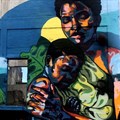
Subscribe & Follow

#WomensMonth: Bushra Razack's journey in Philippi Village's entrepreneurial ecosystem

Here we engage in conversation with Razack as she shares her insights on empowering women, fostering sustainable change, and creating a collective vision for positive transformation.
Can you tell us about the vision behind the creation of Philippi Village and the impact it has had on the local community?
The Philippi Village team (past and current) have transformed this old, abandoned cement factory into a vibrant, integrated community development hub.
We have done this through a people-centred approach. We have used intentional and ongoing community engagement to better understand the needs, aspirations and vision of the people using the space. This has allowed us to strengthen the connection between Philippi Village and the community and ensure their offerings are relevant and accessible.
Our approach puts the community at the heart of the design process. It recognises that the people who use the space will provide the most valuable perspective and insight into how the area functions. The more we can centre this as the evidence behind the design, the more relevant and meaningful our place becomes.
We have made mistakes, and we are learning every day. With each challenge and set back we get closer to defining the vision and building the capacity to achieve it.
In your experience, what role do women play in driving positive change within communities, particularly in the context of sustainability and social development?
Women play an essential role in building strong, resilient communities, providing emotional support, acting as primary caregivers to children and elderly, volunteering, educating, advocating for social causes, and contributing to the local economy through entrepreneurship.
However, it is important to note that these same women are doing all of this whilst navigating the negative effects of gender inequality, violence against women, discrimination and marginalisation.
The entrepreneurs I work with are doing the above while navigating the ‘double bind’ of simultaneous time poverty and income poverty experienced by many women, especially those in low-income contexts, like Philippi.
What are your aspirations for the continued growth and evolution of Philippi Village's entrepreneurship ecosystem?
We focus on the knowledge coming from the community and on the needs, aspirations and dreams of people. This way, our design is a reflection of our values and of a powerful collective vision. It can’t be about my aspiration for the place and ecosystem. It is not about me. It is a collective vision.
I would like to contribute towards it, and help build a place that serves people – an important and inspiring community asset collectively shaped by the people who use it.
I see it as a driver in how people come together, communicate, relate and share. We often ignore how this can spark inspiration and growth in society. The inclusion of mixed-use business hubs like ours in the townships provides people with a way to engage, celebrate, explore and create shared experiences.
Promoting and supporting this allows us to create a shared space, a hub of information and a platform to use this feedback to improve a wide range of outcomes and decision-making. I think that supporting creating beautiful, functional and inspiring places within the township is an economic and social development strategy. I love that I can watch this magic unfold and evolve.
What challenges have you faced in your career and how have you overcome them? Do you have any advice for aspiring women leaders in similar fields?
My challenges have not been dissimilar to other women in the entrepreneurial space. Despite all the challenges personally and professionally – my journey has also been easier than young, black female entrepreneurs in the township space.
I’m committed to doing what I can to recognise this and use my position to support female township entrepreneurs and the females I work with.
What I have tried to do and advise others who can do, is to do the same – to advocate and design for women in whatever work you do. Elevate their work! Support where you can.
One personal/ private goal I have in my work at Philippi Village is to make it easier for the women I work with and set them up for success.
I have built this into my strategy for succession planning and I am grooming a phenomenal young black female from Philippi to take over from me.
I have actively created support networks for female team members. I have worked with HR consultants to design our HR processes and policies to consider the challenges faced by women and mothers.
Build to break barriers, to champion the women you work with and demonstrate visible commitment to gender equity.
How do your initiatives align with your overall entrepreneurial philosophy?
Ultimately the way we approach entrepreneurship should be guided by the impact we seek to achieve, and the approach we want to apply.
Everything we do has to be guided by our purpose. Our outcome is community transformation, and this is why our approach needs to be community-centred.
We are a community-centred space that places the people most affected at the heart of our design. These people are closest to the challenges and help us design our offerings, services and space in response to these challenges. This means the solutions are relevant and change the workplace and community.
The initiatives, partners and offerings need to be aligned and reflect who we are.
Our philosophy needs to be more than words – it should be evident in the choices we make, what we say YES to as well as what we reject. It should be visible through the alignment of people, partners, activities and collaborations.
We do connect many different people and partners – but they all have shared values and desire a common outcome. They subscribe to our philosophy and support us in getting there.
What message do you have for women who are considering taking the leap into entrepreneurship, particularly in the context of community development and sustainability?
I am not an expert entrepreneur, and the Philippi Village business model still needs a lot of work. We have not yet achieved success but we are getting closer every day.
I cannot speak as a successful entrepreneur. What I can share is what helped me so far.
The game changer for me was the support I received to help articulate our purpose. This was the best starting point - understanding the company’s WHY.
From there, I looked for mentors. I looked beyond my network. I asked questions. I listened. I surrounded (and continue to surround) myself by people who are strong in the areas I am not.
And more than anything, I remind myself daily that the decisions I take impact other people’s lives – so I also need to self-reflect regularly and understand my WHY, my triggers, bias and my motivation.

















